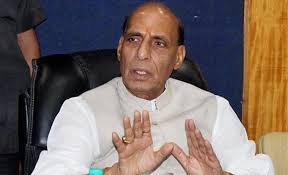MHA ends advance payment rule for deploying central armed forces in states
There were also discussions on central share under post matric and pre-matric scholarship schemes for the SCs/STs/OBCs and schemes for the modernisation of the state police forces, the official said.

The Ministry of Home Affairs (MHA) Monday decided to do away with the condition of advance payment for deployment of central armed forces in states, a senior official said here.
The decision was taken on representation from the state governments, Secretary of the Inter-State Councils Secretariat, R Buhril told reporters.
The ministry used to charge an advance payment for deployment of central armed forces from the states. On the representation of the state governments, the ministry has decided that it would do away with this requirement of advance payment, he said while briefing about the Eastern Zonal Council meeting.
The 23rd meting of the Eastern Zonal Council under the chairmanship of Union Home Minister Rajnath Singh was held here at the Nabanna Sabhaghar, the West Bengal Chief Minister's office.
The meeting was attended by West Bengal Chief Minister Mamata Banerjee and Jharkhand Chief Minister Raghubar Das.
Bihar Chief Minister Nitish Kumar and his Odisha counterpart Naveen Patnaik sent their representatives to the meeting.
While Bihar was represented by Deputy Chief Minister Sushil Kumar Modi, Odisha Finance Minister Shashi Bhusan Behera participated from his state.
Senior officials of the respective states and the Union Home Ministry were also present at the meeting. The meeting also reviewed progress of the unresolved items of the last meeting relating to Phulbari Dam under the 1978 agreement between Bihar and West Bengal governments, Buhril said.
There were also discussions on central share under post matric and pre-matric scholarship schemes for the SCs/STs/OBCs and schemes for the modernisation of the state police forces, the official said.
It also deliberated on the issue of allocation of land for the National Institute of Pharmaceutical Education and Research in Kolkata and Hajipur in Bihar, he said. Out of a total of 30 issues discussed Monday, 26 were resolved, the official said.
There were discussions on maternal and child nutrition through integrated food fortification project, bringing green revolution to eastern India as well as issues relating to mining and coal mining states in this zone, the Inter-State Councils Secretariat secretary said.
There were also discussions on the issues arising out of the bifurcation of Bihar and Jharkhand. There was a review of the rail movement for socio economic development of this zone, railway electrification, construction of dedicated freight corridor and road over bridges and road under bridges in lieu of level crossings, Buhril said.
Jharkhand was carved out of Bihar in 2000.
The Council also took up new issues, including development of allocated coal mines, implementation of various National programmes of health, establishment of shelters for urban homeless under DAY-National Urban livelihood mission, expeditious clearance for right of way for laying optical fibre cable and land acquisition for the development of 11 airports in these states.
The five zonal councils (western, eastern, central, northern and southern) were set up under the States Reorganisation Act, 1956 to foster inter-state cooperation and coordination among the states. They are mandated to discuss and make recommendations on any matter of common interest in the field of economic and social planning, border disputes, linguistic minorities among others.